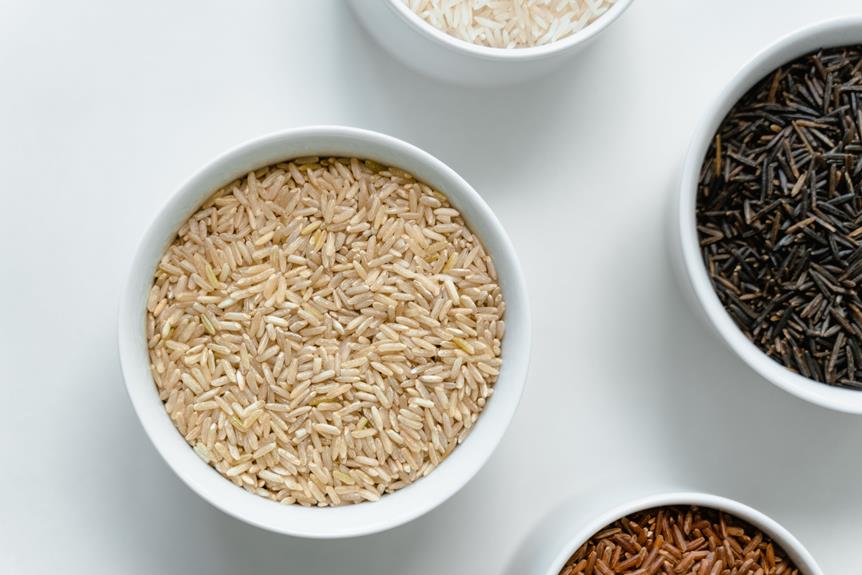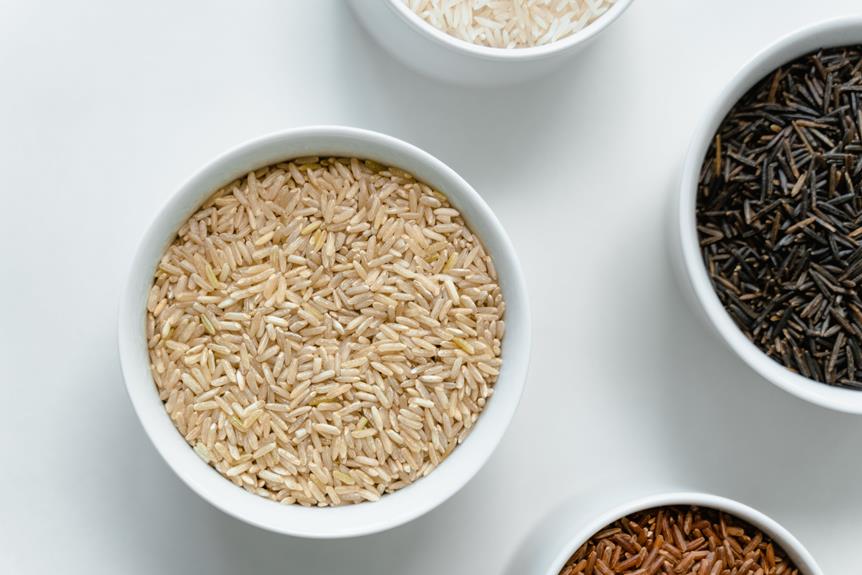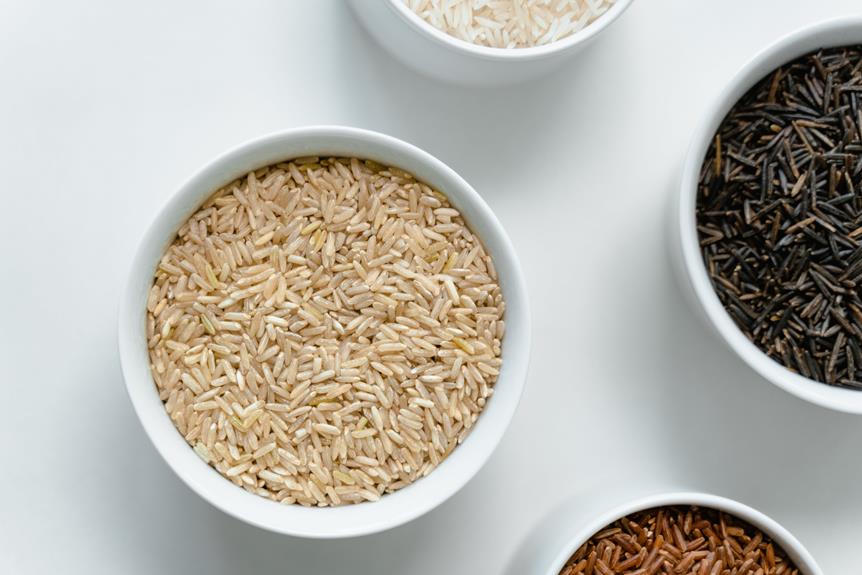Have you ever thought of your gut as a garden? Just like a garden needs nutrient-rich soil to thrive, your gut needs dietary fiber to maintain its health. But are you giving your gut the attention it deserves? Many people overlook the importance of dietary fiber in their diets, focusing instead on other aspects of nutrition. However, the impact of dietary fiber on gut health is undeniable and shouldn't be ignored. So, what exactly does dietary fiber do for your gut? Stay tuned to discover the surprising benefits and learn how you can improve your gut health effortlessly.
Key Takeaways
- Dietary fiber is crucial for maintaining a healthy gut, regulating bowel movements, and supporting gut microbiota diversity.
- Fiber plays a vital role in digestion by aiding in nutrient absorption, promoting healthy gut bacteria, and preventing gut disorders.
- Incorporating fiber-rich foods like fruits, vegetables, whole grains, and legumes into the diet is essential for optimal digestive health.
- Fiber also supports weight management by increasing satiety, reducing calorie absorption, and stabilizing blood sugar levels.
Importance of Dietary Fiber
Dietary fiber plays a crucial role in maintaining a healthy gut. It is the indigestible part of plant-based foods that passes through the digestive system relatively intact. Despite being undigested, fiber offers a range of health benefits that you shouldn't ignore.
First and foremost, fiber promotes regular bowel movements and prevents constipation. It adds bulk to your stool, making it easier to pass through the intestines and preventing the discomfort of constipation. By keeping things moving smoothly, fiber also reduces the risk of developing hemorrhoids and diverticular disease.
Furthermore, dietary fiber helps to regulate blood sugar levels. When you consume fiber-rich foods, they slow down the absorption of sugar into the bloodstream. This prevents spikes in blood sugar and helps to maintain stable energy levels throughout the day. It is particularly beneficial for individuals with diabetes, as it can improve glycemic control and reduce the need for insulin.
In addition, fiber plays a role in maintaining a healthy body weight. High-fiber foods are often low in calories and can help you feel fuller for longer. This can prevent overeating and aid in weight management. Moreover, fiber-rich foods require more chewing, which slows down the eating process and gives your brain more time to register feelings of fullness.
Lastly, dietary fiber acts as a prebiotic, providing nourishment for the beneficial bacteria in your gut. These bacteria help to maintain a healthy balance in your gut microbiome, which is crucial for overall gut health and immune function.
It is clear that dietary fiber plays a vital role in maintaining a healthy gut. By including fiber-rich foods in your diet, you can support bowel regularity, stabilize blood sugar levels, manage your weight, and promote a healthy gut microbiome.
Role of Dietary Fiber in Digestion
Now let's talk about the role of dietary fiber in digestion. Dietary fiber plays a crucial role in maintaining a healthy gut microbiota, which are the beneficial bacteria in your digestive system. It also helps regulate bowel movements, promoting regularity and preventing issues like constipation.
Fiber and Gut Microbiota
Including dietary fiber in your meals plays a crucial role in promoting a healthy gut microbiota and supporting efficient digestion. The gut microbiota refers to the trillions of bacteria residing in your digestive tract, which play a vital role in maintaining overall health. Here's how fiber influences your gut microbiota and digestion:
- Increases beneficial bacteria: Dietary fiber acts as a prebiotic, providing nourishment to beneficial bacteria in the gut. This promotes their growth and helps maintain a diverse and balanced microbiota.
- Enhances digestion: Fiber adds bulk to your stool, which helps regulate bowel movements and prevent constipation. It also aids in the absorption of water, ensuring proper hydration of the digestive system.
- Fermentation and short-chain fatty acids: Some types of fiber are fermented by gut bacteria, producing short-chain fatty acids. These compounds provide energy for the cells lining the colon and support a healthy gut environment.
Fiber and Bowel Movements
Consuming an adequate amount of dietary fiber is essential for maintaining regular bowel movements and supporting efficient digestion. Fiber plays a crucial role in the digestive process, as it adds bulk to your stool and helps it move through your intestines smoothly. When you consume enough fiber, it absorbs water and softens your stool, making it easier to pass. This can help prevent constipation and promote regular bowel movements. Additionally, fiber acts as a prebiotic, providing nourishment for the beneficial bacteria in your gut. These bacteria play a key role in digestion, breaking down fiber into short-chain fatty acids that provide energy for your colon cells. So, make sure to include plenty of fiber-rich foods in your diet to support healthy bowel movements and overall digestive health.
Fiber and Gut Microbiota
Now let's talk about how fiber interacts with your gut bacteria and its role in digestion. Your gut is home to trillions of bacteria that play a crucial role in maintaining your overall health. Fiber acts as a source of food for these bacteria, allowing them to thrive and carry out essential functions. Additionally, fiber helps regulate bowel movements and promotes healthy digestion by adding bulk to your stool.
Gut Bacteria and Fiber
Improving your gut health can be achieved by incorporating dietary fiber into your meals. Fiber plays a crucial role in maintaining a healthy gut microbiota, which refers to the trillions of bacteria residing in your digestive system. Here are three key ways in which fiber interacts with gut bacteria:
- Fermentation: Fiber serves as food for beneficial bacteria in your gut. When these bacteria consume fiber, they produce short-chain fatty acids, such as butyrate, which help to nourish the colon cells and promote a healthy gut environment.
- Increased diversity: Consuming a variety of fiber-rich foods can promote the growth of different types of beneficial bacteria in your gut, leading to a more diverse and balanced microbiota.
- Protection against harmful bacteria: Dietary fiber can prevent the overgrowth of harmful bacteria by creating a favorable environment for beneficial bacteria to thrive, thus reducing the risk of infection and inflammation.
Fiber's Role in Digestion
Incorporating dietary fiber into your meals plays a crucial role in maintaining a healthy gut microbiota, benefiting digestion and overall gut health. Fiber acts as a prebiotic, providing nourishment for the beneficial bacteria in your gut. These bacteria ferment the fiber, producing short-chain fatty acids (SCFAs) that have numerous benefits. SCFAs help to nourish the cells lining your intestines, promote a healthy gut barrier, and reduce inflammation. Fiber also adds bulk to your stool, helping to prevent constipation and promote regular bowel movements. By including a variety of fiber-rich foods in your diet, such as fruits, vegetables, whole grains, and legumes, you can support your gut microbiota and optimize your digestion.
| Fiber-Rich Foods | Examples |
|---|---|
| Fruits | Apples, bananas, oranges |
| Vegetables | Broccoli, carrots, spinach |
| Whole Grains | Brown rice, quinoa, oats |
| Legumes | Lentils, chickpeas, black beans |
| Nuts and Seeds | Almonds, chia seeds, flaxseeds |
Fiber for Regular Bowel Movements
Are you struggling with maintaining regular bowel movements? Consider incorporating fiber into your diet for a natural and effective solution. Fiber plays a crucial role in promoting regular bowel movements and preventing constipation. Here are three reasons why fiber can help you achieve a healthy digestive system:
- Increased stool bulk: Fiber adds bulk to your stool, making it easier to pass through your digestive system. It absorbs water, softening the stool and speeding up its transit time. This helps prevent constipation and promotes regular bowel movements.
- Improved bowel regularity: Including fiber-rich foods in your diet helps regulate the movement of food through your intestines. This helps establish a regular pattern of bowel movements, ensuring that waste is efficiently eliminated from your body.
- Promotion of healthy gut bacteria: Fiber acts as a prebiotic, providing nourishment to the beneficial bacteria in your gut. These bacteria produce short-chain fatty acids, which help maintain a healthy gut environment. A balanced gut microbiome is essential for optimal digestion and bowel function.
To incorporate more fiber into your diet, focus on consuming a variety of whole grains, fruits, vegetables, legumes, and nuts. Aim for at least 25-30 grams of fiber per day, gradually increasing your intake to avoid digestive discomfort. Remember to drink plenty of water to help the fiber move smoothly through your digestive system.
Fiber's Impact on Nutrient Absorption
Fiber plays a crucial role in facilitating nutrient absorption within your body. It acts as a dietary sponge, helping to soak up and carry nutrients through your digestive system, ensuring that they are properly absorbed and utilized by your body. Without an adequate intake of fiber, your body may struggle to absorb essential vitamins, minerals, and other nutrients, leading to potential deficiencies and health issues.
To better understand the impact of fiber on nutrient absorption, let's take a closer look at the table below:
| Nutrient | Role | Fiber's Impact |
|---|---|---|
| Vitamins | Essential for various bodily functions, including immune health and energy production | Fiber helps to slow down digestion, allowing more time for the absorption of vitamins in the small intestine |
| Minerals | Important for maintaining healthy bones, regulating fluid balance, and supporting nerve function | Fiber can bind to certain minerals, such as calcium and magnesium, aiding their absorption |
| Antioxidants | Protect the body against oxidative stress and inflammation | Fiber can enhance the absorption of antioxidants, such as polyphenols, by promoting their release from plant foods |
| Protein | Essential for building and repairing tissues, producing enzymes and hormones, and supporting immune function | Fiber can help slow down protein digestion, allowing for better absorption of amino acids in the small intestine |
| Fats | Provide energy, support cell growth, and aid in the absorption of fat-soluble vitamins | Fiber can help regulate fat metabolism and promote the absorption of healthy fats |
Fiber and Weight Management
To effectively manage your weight, it is important to understand the role that dietary fiber plays in your overall health. Fiber is a type of carbohydrate that cannot be digested by the body, but it plays a crucial role in maintaining a healthy weight. Here are three ways in which fiber supports weight management:
- Increased satiety: Fiber adds bulk to your diet, which helps you feel fuller for longer. When you consume foods high in fiber, they take up more space in your stomach, triggering signals of fullness to your brain. As a result, you are less likely to overeat and consume excess calories, which can lead to weight gain.
- Reduced calorie absorption: Fiber can help reduce the absorption of calories from the foods you eat. When you consume fiber-rich foods, they slow down the digestion process, allowing your body to absorb fewer calories from the carbohydrates and fats present in your meal.
- Stabilized blood sugar levels: High-fiber foods, such as whole grains, fruits, and vegetables, have a lower glycemic index. This means they are digested and absorbed more slowly, leading to a slower rise in blood sugar levels. Stable blood sugar levels can help prevent spikes and crashes in energy, reducing the likelihood of overeating and weight gain.
Incorporating fiber-rich foods into your diet is an effective strategy for weight management. Aim to include sources of fiber, such as whole grains, legumes, fruits, vegetables, and nuts, in your meals and snacks. Remember to increase your fiber intake gradually and drink plenty of water to support healthy digestion. By prioritizing fiber and making it a regular part of your diet, you can better manage your weight and improve your overall health.
Fiber and Prevention of Gut Disorders
Incorporating a high-fiber diet can play a crucial role in preventing various gut disorders. By consuming an adequate amount of dietary fiber, you can help maintain a healthy gut and reduce the risk of developing gastrointestinal issues.
One of the gut disorders that can be prevented with fiber intake is constipation. Fiber adds bulk to your stool, making it easier to pass through the digestive system. It also helps regulate bowel movements by promoting regularity. By including fiber-rich foods like fruits, vegetables, whole grains, and legumes in your diet, you can prevent constipation and maintain a healthy digestive system.
Another gut disorder that dietary fiber can help prevent is diverticulosis. Diverticulosis occurs when small pouches form in the lining of the colon. These pouches can become inflamed and lead to diverticulitis, a more serious condition. A high-fiber diet helps prevent diverticulosis by keeping the stool soft and reducing pressure in the colon, thus decreasing the risk of pouch formation.
Furthermore, a high-fiber diet may also help prevent hemorrhoids, which are swollen blood vessels in the rectum or anus. Hemorrhoids can be caused by straining during bowel movements. By adding fiber to your diet, you can soften the stool and reduce the need for straining, thus lowering the risk of developing hemorrhoids.
Fiber's Role in Reducing Inflammation
Consuming an adequate amount of dietary fiber can have a significant impact on reducing inflammation in your gut. Fiber acts as a prebiotic, providing nourishment for the beneficial bacteria in your gut, which in turn helps to lower inflammation levels. Here are three ways in which fiber plays a role in reducing inflammation:
- Fiber promotes a healthy gut microbiome: When you consume fiber-rich foods, such as fruits, vegetables, whole grains, and legumes, they pass through your digestive system intact. This provides a food source for the good bacteria in your gut, allowing them to thrive and multiply. These beneficial bacteria produce short-chain fatty acids (SCFAs) as they break down the fiber. SCFAs have anti-inflammatory properties and help to maintain a healthy gut environment.
- Fiber regulates the immune response: Inflammation in the gut can occur when the immune system is overactive or dysregulated. Dietary fiber helps to regulate the immune response by promoting a balance between pro-inflammatory and anti-inflammatory signals. This balance is crucial for reducing inflammation in the gut and preventing chronic gut disorders.
- Fiber improves bowel regularity: Adequate fiber intake promotes regular bowel movements and prevents constipation. When waste materials linger in the colon for too long, it can lead to increased inflammation. By keeping your digestive system regular, fiber helps to prevent inflammation and maintain a healthy gut.
Incorporating fiber-rich foods into your diet is a simple and effective way to reduce inflammation in your gut. Aim to include a variety of fruits, vegetables, whole grains, and legumes in your meals to ensure you're getting enough dietary fiber. By doing so, you can support a healthy gut and reduce the risk of gut disorders associated with inflammation.
Ways to Increase Dietary Fiber Intake
To increase your dietary fiber intake and support gut health, you can easily incorporate more fiber-rich foods into your daily meals. Increasing your fiber intake is not a difficult task and can be achieved by making simple changes to your eating habits.
One way to increase your fiber intake is by adding more fruits and vegetables to your diet. These foods are naturally high in fiber and can easily be incorporated into meals or eaten as snacks. For example, you can add berries to your breakfast cereal or yogurt, or have a side of steamed vegetables with your lunch or dinner. By including a variety of fruits and vegetables in your meals, you can increase your fiber intake and support a healthy gut.
Another way to increase your fiber intake is by choosing whole grains over refined grains. Whole grains, such as whole wheat bread, brown rice, and oatmeal, contain more fiber compared to their refined counterparts. You can start by replacing white bread with whole wheat bread, or white rice with brown rice. These simple swaps can make a big difference in your fiber intake and contribute to a healthier gut.
Legumes, such as beans, lentils, and chickpeas, are also great sources of fiber. Including these in your meals can help increase your fiber intake. You can add beans or lentils to soups, stews, or salads, or make a delicious hummus with chickpeas. These versatile legumes not only add fiber to your diet but also provide important nutrients to support your gut health.
Incorporating more fiber-rich foods into your daily meals doesn't have to be complicated. By making small changes and being mindful of your food choices, you can easily increase your fiber intake and support a healthy gut. So go ahead and start adding more fruits, vegetables, whole grains, and legumes to your diet today!
Frequently Asked Questions
What Is the Recommended Daily Intake of Dietary Fiber?
The recommended daily intake of dietary fiber depends on various factors such as age, gender, and overall health. However, generally speaking, adults should aim for around 25-30 grams of fiber per day. This can be easily achieved by incorporating fiber-rich foods into your diet, such as whole grains, fruits, vegetables, and legumes. Remember, consuming an adequate amount of dietary fiber is essential for maintaining a healthy gut and overall well-being.
Can Dietary Fiber Help With Weight Loss?
Dietary fiber can definitely help with weight loss. It adds bulk to your meals, making you feel fuller for longer and reducing the likelihood of overeating. Fiber also slows down the digestion and absorption of nutrients, helping to regulate blood sugar levels and prevent spikes in insulin. Additionally, high-fiber foods tend to be low in calories and fat, making them ideal choices for weight management. So, including plenty of dietary fiber in your diet is a smart move for shedding those extra pounds.
Are There Any Risks or Side Effects Associated With Consuming Too Much Dietary Fiber?
Consuming too much dietary fiber can have some risks and side effects. While it is important to include fiber in your diet for good gut health, overdoing it can lead to digestive issues such as bloating, gas, and stomach cramps. Additionally, excessive fiber intake can interfere with nutrient absorption and cause deficiencies. It's essential to strike a balance and not ignore the potential downsides of consuming excessive amounts of dietary fiber.
How Does Dietary Fiber Affect Blood Sugar Levels?
Dietary fiber has a significant impact on blood sugar levels. It slows down the digestion and absorption of carbohydrates, preventing a sudden spike in blood sugar. This is especially beneficial for individuals with diabetes or those at risk of developing it. Fiber-rich foods, such as whole grains, fruits, and vegetables, can help regulate blood sugar levels and improve overall glycemic control. Including these foods in your diet can contribute to better blood sugar management and overall health.
Are There Any Specific Foods That Are High in Dietary Fiber?
There are plenty of specific foods that are high in dietary fiber. Some examples include fruits like apples, berries, and pears, as well as vegetables like broccoli, carrots, and Brussels sprouts. Whole grains such as oats, quinoa, and brown rice are also good sources of fiber. Additionally, legumes like chickpeas, lentils, and black beans are packed with fiber. Adding these foods to your diet can help improve your gut health and overall well-being.




